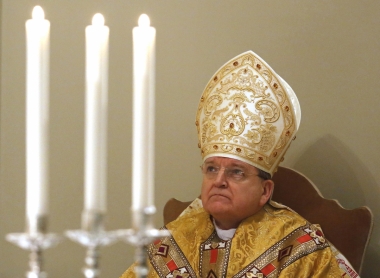A Roman Catholic cardinal in the US has blamed radical feminism for leaving men “marginalised” in the Church since the 1960s.
Interviewed by Matthew Christoff of the New Evangelization Project, which focuses on resourcing men in their discipleship as members of the Catholic Church, Cardinal Raymond Burke said: “Unfortunately, the radical feminist movement strongly influenced the Church, leading the Church to constantly address women’s issues at the expense of addressing critical issues important to men.”
He said that “the goodness and importance of men became very obscured, and for all practical purposes, were not emphasised at all … So much of this tradition of heralding the heroic nature of manhood has been lost in the Church today.”
Cardinal Burke, a noted theological conservative, spoke of the need for children to have good relationships with their fathers, saying: “We need that very close and affirming relationship with the mother, but at the same time, it is the relationship with the father, which is of its nature more distant but not less loving, which disciplines our lives. It teaches a child to lead a selfless life, ready to embrace whatever sacrifices are necessary to be true to God and to one another.”
He said: “I recall in the mid-1970’s, young men telling me that they were, in a certain way, frightened by marriage because of the radicalizing and self-focused attitudes of women that were emerging at that time. These young men were concerned that entering a marriage would simply not work because of a constant and insistent demanding of rights for women. These divisions between women and men have gotten worse since then.”
The cardinal spoke of the abuse of women by men who “violated their own manly character” by their actions. He blamed a “fluffy, superficial kind of catechetical approach” to issues of sexuality and the “explosion of pornography” which “leads men and women to view their human sexuality apart from a relationship between a man and woman in marriage”.
He called for a recovery of home life in which children ate and talked with their parents, saying: “My generation has taken for granted the many blessings we were blessed with in our solid family lives and with the Church’s solid formation of us. My generation let all of this nonsense of sexual confusion, radical feminism and the breakdown of the family go on, not realising that we were robbing the next generations of the most treasured gifts that we had been blessed to receive.”
One of the consequences of ‘radical feminism’, he said, was that “The activities in the parish and even the liturgy have been influenced by women and have become so feminine in many places that men do not want to get involved.
“Men are often reluctant to become active in the Church. The feminized environment and the lack of the Church’s effort to engage men has led many men to simply opt out.”
The cardinal called for a recovery of a sense of sin, whose loss he blamed on a liberalising movement in the Church following the Second Vatican Council in the 1960s. “Men are not going to Confession today because there has been a denial of sin,” he said. “There was a period after Vatican II where many were promoting the idea that there weren’t any serious sins. Of course, this is lethal for men, especially young men.”
He continued: “Confronting sin is central to being able to love one another. How does a man love? He loves by obeying the Ten Commandments. After Vatican II, that great call to love by confronting sin was lost, leading to the most horrible abuses of individuals, abusing themselves or others, the break down of family life, a precipitous drop in Mass attendance and the abandonment of the Sacrament of Penance. We must restore the sense of sin to men, for men to recognise their sins and express deep sorrow for their sins.”
Source: Christian Today



